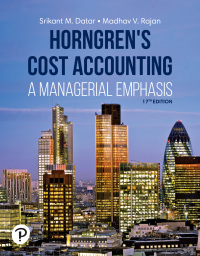BlueBox Company uses standard costing. The company has two manufacturing plants, one in Shanghai and the other
Question:
BlueBox Company uses standard costing. The company has two manufacturing plants, one in Shanghai and the other in Shenzhen. For the Shanghai plant, BlueBox has budgeted annual output of 2,000,000 units. Standard labor-hours per unit are 0.50, and the variable overhead rate for the Shanghai plant is $3.30 per direct labor-hour. Fixed overhead for the Shanghai plant is budgeted at $2,400,000 for the year.
For the Shenzhen plant, BlueBox has budgeted annual output of 2,100,000 units with standard laborhours also 0.50 per unit. However, the variable overhead rate for the Shenzhen plant is $3.10 per hour, and the budgeted fixed overhead for the year is only $2,205,000.
Firm management has always used variance analysis as a performance measure for the two plants and has compared the results of the two plants.
Ken Wooi Keong has just been hired as a new controller for BlueBox. Ken is good friends with the Shenzhen plant manager and wants him to get a favorable review. Ken suggests allocating the firm’s budgeted common fixed costs of $3,150,000 to the two plants, but on the basis of one-third to the Shenzhen plant and two-thirds to the Shanghai plant. His explanation for this allocation base is that Shanghai is a more expensive state than Shenzhen.
At the end of the year, the Shanghai plant reported the following actual results: output of 1,950,000 using 1,020,000 labor-hours in total, at a cost of $3,264,000 in variable overhead and $2,440,000 in fixed overhead.
Actual results for the Shenzhen plant are an output of 2,175,000 units using 1,225,000 labor-hours with a variable cost of $3,920,000 and fixed overhead cost of $2,300,000. The actual common fixed costs for the year were $3,075,000.
Required
1. Compute the budgeted fixed cost per labor-hour for the fixed overhead separately for each plant:
a. Excluding allocated common fixed costs
b. Including allocated common fixed costs
2. Compute the variable overhead spending variance and the variable overhead efficiency variance separately for each plant.
3. Compute the fixed overhead spending and volume variances for each plant:
a. Excluding allocated common fixed costs
b. Including allocated common fixed costs
4. Did Ken Wooi Keong’s attempt to make the Shenzhen plant look better than the Shanghai plant by allocating common fixed costs work? Why or why not?
5. Should common fixed costs be allocated in general when variances are used as performance measures? Why or why not?
6. What do you think of Ken Wooi Keong’s behavior overall?
Step by Step Answer:

Horngrens Cost Accounting A Managerial Emphasis
ISBN: 9780135628478
17th Edition
Authors: Srikant M. Datar, Madhav V. Rajan





